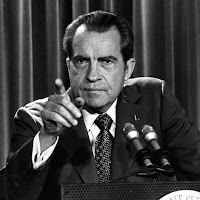 The transcript of Nixon’s testimony about Watergate became public Thursday, providing a detailed view of Nixon - combative, defensive and mindful of his place in history [link]. As an exercise in deception-detection, I suggested we parse a short passage of Nixon’s testimony. We limited it to the response Nixon gave to a specific question asked by federal prosecutors. We examined the implications Nixon made in order to give prosecutors the impression that he was acting as Chief Executive and giving high-level ‘directives’ to his staff ..and not ordering the Watergate break-in. When prosecutors asked about White House efforts to target Lawrence O'Brien (Chairman of the Democratic National Committee) and the events leading up to the break-in at his office in the Watergate complex, Nixon replied:
The transcript of Nixon’s testimony about Watergate became public Thursday, providing a detailed view of Nixon - combative, defensive and mindful of his place in history [link]. As an exercise in deception-detection, I suggested we parse a short passage of Nixon’s testimony. We limited it to the response Nixon gave to a specific question asked by federal prosecutors. We examined the implications Nixon made in order to give prosecutors the impression that he was acting as Chief Executive and giving high-level ‘directives’ to his staff ..and not ordering the Watergate break-in. When prosecutors asked about White House efforts to target Lawrence O'Brien (Chairman of the Democratic National Committee) and the events leading up to the break-in at his office in the Watergate complex, Nixon replied: “I do not recall suggesting Mr. O’Brien files be checked ..I only suggested that in this campaign, we should be as effective in conducting our investigations as they (the Democrats) had been in conducting their investigations.”[ I only suggested .. ] implies no direct orders were given. Although prosecutors may infer ‘tacit approval’, without knowing what was going on in the minds of the White House staff at the time; prosecutors couldn’t go there. That information was only available in discussions leading up to this point. But the previous 18 minutes were erased from the White House tape. *See Footnote*
[conducting our investigation .. ] implies they were only discussing an equitable response to what Democrats were doing during the campaign. Since there was no evidence of criminal activity on the part of Democrats, prosecutors could only conclude Nixon wasn’t suggesting anything inappropriate.
It’s clear Nixon was using pragmatic implications [link] ..a trick that lawyers routinely recommend to their clients. He could deny culpability but, at the same time, avoid perjury in the advent investigators found evidence that he actually did order the break-in. Instead of denying it outright, he says is he was making what amounts to a ‘suggestion’ that they conduct an ‘equitable investigation’. If it comes out later that he gave orders, he cannot be accused of perjury for the inferences federal prosecutors made in response to his statements. In other words, implications are not grounds for perjury. To the end, Nixon played the role of an attorney trying to create ‘reasonable doubt’ in the minds of his jurors (Historians).
* Footnote: Congress actually did infer that, by omission, the 18-minute gap probably contained incriminating information turning Nixon’s statement into a criminal act. This is what led to a vote of impeachment by over two-thirds of the House.
No comments:
Post a Comment